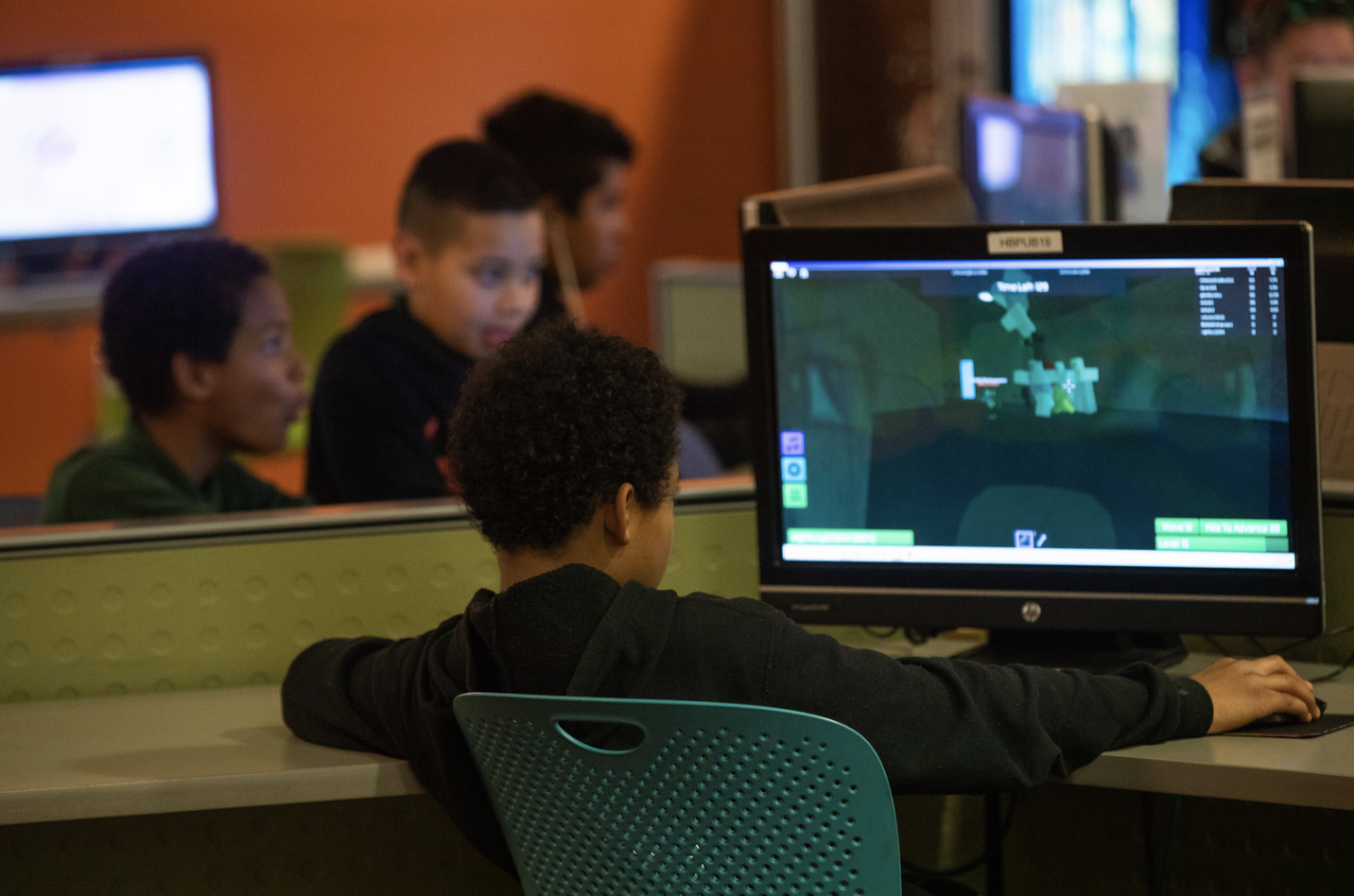Online Learning Backstops Education’s Virus Backslide

A woman works on her notebook, February 3, 2019 Cologne, Germany (Photo by Marco Verch) Creative Commons license via Flickr
By Sunny Lewis for Maximpact
NEW YORK, New York, June 4, 2020 (Maximpact.com News) – School closures to control the spread of the COVID-19 pandemic have left roughly 60 percent of the world’s children without an education. In fact, global human development could backslide this year for the first time since the concept was introduced in 1990, the United Nations Development Programme (UNDP) is warning in a new report.
“The world teeters on the verge of going backwards, during the course of this year,” the UNDP declared.
With classrooms shuttered and stark divides in access to online learning, UNDP assessments show that 86 percent of children in primary education are now effectively out of school in countries with low human development, compared with just 20 percent in countries with very high levels of development.
Issued on May 20, the report, “Human Development Perspectives COVID-19: Assessing the Impact, Envisioning the Recovery,”<http://hdr.undp.org/en/hdp-covid> estimates that the percentage of primary school-age children who are not getting any schooling is now at “global levels not seen since the 1980s.”
“The world has seen many crises over the past 30 years, including the Global Financial Crisis of 2007-09,” said UN Development Programme Administrator Achim Steiner. “Each has hit human development hard but, overall, development gains accrued globally year-on-year.”
“COVID-19, with its triple hit to health, education, and income, may change this trend,” predicts Steiner, who headed the UN Environment Programme for years until he switched to the UNDP.
Declines in fundamental areas of human development – measured as a combination of the world’s education, health and living standards – are being felt across most countries, both rich and poor, in every region.
The World Economic Forum <https://www.weforum.org/agenda/2020/04/coronavirus-education-global-covid19-online-digital-learning/> estimated in April that worldwide there were more than 1.2 billion children in 186 countries affected by school closures due to the pandemic.
But for those with computers and Internet access, the online world is rich with free courses and webinars.
Going Online for Free Courses
As a substitute for in-person classes, online learning is an important solution, and there is hope that countries can close the education gap by providing more equitable Internet access.
“This crisis shows that if we fail to bring equity into the policy toolkit, many will fall further behind,” said Pedro Conceição, UNDP director of the Human Development Report Office.
“This is particularly important for the new necessities of the 21st century, such as access to the Internet, which is helping us to benefit from tele-education, tele-medicine, and to work from home,” Conceição said.
Now, with most schools closed due to the coronavirus, the Internet has risen to the challenge. Many free online courses exist, at all levels of learning.
For instance, ABCmouse.com® Early Learning Academy, is a comprehensive, research-validated curriculum for preschool through second grade, available on all major digital platforms and used by tens of millions of children to date. It offers more than 850 self-guided lessons across 10 levels. A companion program focuses on teaching English as a second language for this age group.
Adventure Academy™, is the first-of-its-kind educational massive multiplayer online game, serving elementary and middle-school-aged children with thousands of learning activities in a fun and safe virtual world.
ReadingIQ® is a digital library and literacy platform for children 12 and under designed by reading experts to improve literacy skills, with many thousands of expert-curated books from leading publishers.
ABCmouse for Teachers and ABCmouse for Schools are always free for all schools and teachers in the United States, and ABCmouse is partnering with UNICEF to offer online courses for students who speak languages other than English.
That’s fine for families who have computers. For those who don’t, some are receiving help.
Amazon, the multinational conglomerate technology company into e-commerce, cloud computing, digital streaming, and artificial intelligence, is offering to help in the company’s hometown of Seattle, Washington.
Amazon is donating 8,200 laptops to families of elementary-school students in Seattle Public Schools who don’t have access to a device needed for remote learning while schools are closed because of the COVID-19 pandemic.
About 33 percent of Seattle students come from families with low incomes, according to state education data.
The donation kick-starts a new fund, the Education Equity Fund, stewarded by the school district’s nonprofit partner, the Alliance for Education. Businesses, community groups and individuals can donate to the fund, which aims to “support students furthest from educational justice in accessing the technology, technical support and additional learning resources required to continue to learn during the COVID-19 crisis,” Amazon and the School District said in a statement in April.

Boys take eagerly to the computers at the San José Public Library, San José, California, December 21, 2018. (Photo by Edward Duncan courtesy San José Public Library) Creative Commons license via Flickr
Farther south in San Diego, California, the nonprofit Computers2Kids collects, recycles and refurbishes used computers donated by individuals and corporations and gives them to San Diego families in need. C2K provides each recipient with the education, training and technical support needed for success.
Adults Can Search for Online Freebies Bigtime
Adults, too, need to keep learning during lockdown. In the United Kingdom, a new online learning platform to help boost the nation’s skills while people are staying at home, was launched April 28 by Education Secretary Gavin Williamson.
Free courses are available through the new online platform hosted on the gov.uk website, called The Skills Toolkit <https://theskillstoolkit.campaign.gov.uk/>. The new platform gives people access to free, high-quality digital and numbers courses to help build their skills, progress in work and boost their job prospects.
Courses on offer cover a range of levels, from everyday maths and tools for using email and social media more effectively at work to more advanced training.
People can access courses that help them create online content developed by the University of Leeds and the Institute of Coding, to understand the Fundamentals of Digital Marketing from Google Digital Garage, and to learn how to code for data analysis from the Open University. All courses are online and flexible, so people can work through them at their own pace.
Secretary Williamson said, “I want businesses to encourage their furloughed employees to use The Skills Toolkit to improve their knowledge, build their confidence and support their mental health so they have skills they need to succeed after the coronavirus outbreak.”
South Africa offers many free courses to university-level students, the news service “Briefly” reports <https://briefly.co.za/25905-list-free-online-courses-south-africa-2020.html>
For example, Wits University offers free accredited online courses with certificates in such disciplines as learning to program, cryptography, and system dynamics for health sciences.
Many online learning platforms are offering free access, such as Byju’s, an educational technology and online tutoring firm founded in 2011 in Bangalore, India.
The Byju’s Learning App is the world’s largest platform for school students with 42 million registered users, the company is proud to say. The app offers comprehensive learning programs in math and science for students between classes 4th-12th. It also has test prep courses for competitive exams.
Since announcing free live classes on its Think and Learn app, Byju’s has seen a 200 percent increase in the number of new students using its product, Mrinal Mohit, the company’s chief operating officer, told the “Times of India” in April <https://timesofindia.indiatimes.com/gadgets-news/byjus-adds-free-live-classes-for-students-amidst-covid-19-lockdown/articleshow/74971274.cms>.
Around the world creative community solutions abound. Let’s get connected!
Maximpact’s Online Learning
At Maximpact we took learning online over four years ago. We started with Grant Writing Training, Fundraising, Waste management and Water management online instructor led training courses. We added on an online English for Refugees in 2018, which has been successfully running since. Our English for Refugees online live has trained over 85 refugees.
To find out more about our online programmes contact us at info@maximpact.com or visit www.Maximpact.com